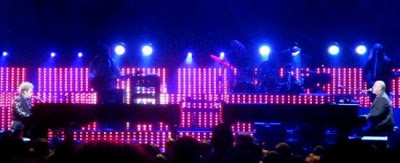
It was the meeting of a knight and a brawler, a U.K. glam-pop prince and a Bronx bomber. Elton John (Sir Elton to us paupers) and Billy Joel shared the stage Thursday at Wrigley Field, but little else.
The two piano players who dominated pop radio in the ‘70s and ‘80s presented contrasting styles that didn’t always mesh. John entered in a sequined tux and tinted glasses, a more restrained version of his Liberace-on-acid ‘70s look. Joel, meanwhile, could’ve passed for a stock broker with his tan, salt-and-pepper goatee and sports jacket.
John was mostly business, focusing intently on music that has held up well. Joel cracked wise in a lousy Chicago accent, told jokes and mugged a lot. His music had a similar attention-demanding brassiness.
Between the two, they offered a set that could’ve been lifted from their first tour together, in 1994 — not that anyone in the audience seemed to be complaining. The John-Joel juggernaut is one of the more lucrative tours in a recession-racked summer, despite top tickets that cost $175 plus service fees. Wrigley was sold out of 40,000 tickets (some seats remain for the duo’s encore Tuesday at the same location), and Joel squinted toward the upper-grandstand from his grand piano in center field and cracked, “Those are [lousy] seats and you actually bought ‘em — thank you very much.”
They came and they spent because these graying giants offered 35 tunes that have become staples of oldies radio and karaoke bars, while providing endless fodder for YouTube parodies and tributes. The voices of the two headliners have frayed a bit; John’s is noticeably deeper and Joel has lost considerable range. But the songs have hung around. As one fan in my section said, “Everyone here knows every word.”
The two piano players faced each other at the outset and swapped verses on four crowd-pleasers: John’s “Your Song” and “Don’t Let the Sun Go Down on Me” and Joel’s “Just the Way You Are” and “My Life.” Though intriguing to imagine the two taking on each other’s songs, the opening face-off had the schmaltzy aroma of a Vegas show, complete with the requisite preening.
But when Joel exited and left the stage to John, the show took off. His five-piece band did its share, especially Bob Birch, whose supple, melodic bass lines were like little songs in themselves. The rococo rock flourishes of “Funeral for a Friend,” the avant-pop orchestrations and percussive piano of “Madman Across the Water,” the fresh gospel take on “Levon” – John brought new energy and ideas to songs that are more than three decades old. “Rocket Man” was his trump card; an extended coda found John playing a pensive solo against Davey Johnstone’s acoustic guitar, then shifting into Professor Longhair-like New Orleans mode.
Joel was next. His self-deprecating Every-mook approach has limited charm and wore thin quickly. Like John, he drew heavily on the music of his youth for inspiration, rejiggering everything from doo-wop to the Beatles. But his songs couldn’t match the elegance of John’s ballads or the swing of his counterpart’s rockers. Instead, Joel’s songs suggested someone jabbing you in the chest to provoke a fight – there’s no other way to describe the truly annoying “We Didn’t Start the Fire,” the “ack-ack-ack” of “Movin’ Out (Anthony’s Song)” or the parody-as-travesty of “It’s Still Rock ‘n’ Roll to Me.”
Sometimes Joel just appeared to be trying too hard, cramming too many ideas into his arrangements and too much shtick into his presentation. Whereas John was the consummate pro, Joel (at 60, two years younger than John) resembled the over-eager apprentice.
But Joel got the last word. As the fans stood and swayed at the finish, it was his “Piano Man” they were singing. And like the song says, they put plenty of bread in his jar.
COMMENTS
There aren't any comments yet.
Comments are closed.
